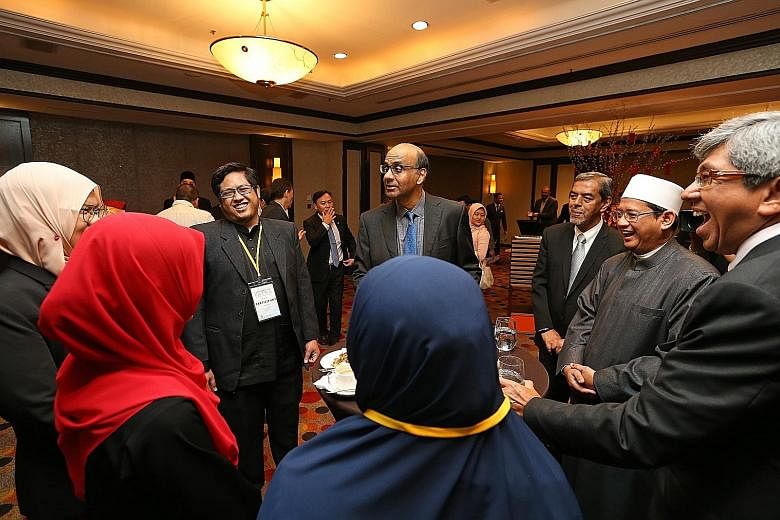A committee of senior Islamic scholars in Singapore has, through its fatwas or rulings over the years, helped Muslims here understand their religious and civic identities, and balance their obligations.
In doing so, the Fatwa Committee has helped build a harmonious multicultural society over the years, Deputy Prime Minister Tharman Shanmugaratnam said yesterday.
"The committee's independent thinking, guided by their ethical and moral commitments and a keen eye on public interest, augurs well for the future of Islam in Singapore, and also for our multiculturalism," he said at the first conference on fatwa in contemporary societies organised by the Islamic Religious Council of Singapore (Muis).
Mr Tharman noted that since its formation in 1968, the Fatwa Committee has tackled complex issues, including biomedical developments such as stem cell research and therapeutic cloning. It has also helped strengthen families, and CPF and insurance nominations are now accepted as valid ways of transferring wealth within Muslim families.
He commended the Fatwa Committee for its "progressive outlook, and its courage to offer solutions that are meaningful and practical".
The committee has also engaged the Muslim community to discuss the objectives and rationale behind its fatwas, and explain why it may, at times, depart from the positions of religious bodies elsewhere. Such engagement, Mr Tharman noted, is "how our Muslim religious leaders help engender trust and confidence in fatwas that are suited for Muslims living in Singapore".
Mr Tharman, who is Coordinating Minister for Economic and Social Policies, spoke about Singapore's active and inclusive brand of multiculturalism, which he noted was unlike the "live and let live" passive approach many societies take. "Live and let live has not worked," he said, pointing to how generations of minorities in some European nations still feel like outsiders.
In Singapore, multiculturalism involves an entire system of laws, an activist government, committed religious and community leaders, and values and norms that have been shaped over the years, Mr Tharman told 300 Islamic religious teachers, scholars, and legal and medical professionals at the one-day event.
This includes laws preserving the freedom to practise one's religion and protecting race and religion from denigration, and policies to promote the common space in schools and offices.
The absence of ethnic conflict in Singapore, one of the most culturally diverse countries in the world, is a precious oddity. But while Singapore's approach means it starts from "a position of strength", society must go further, he said. "We must deepen multiculturalism in our next phase of nation-building."
This does not mean diluting or weakening various cultures to forge a single culture. Neither is it about only strengthening each culture separately - for this will make Singapore "more vulnerable to the winds of religious and ethnic conflict that are blowing across the world".
"To deepen our resilience as a society, we must deepen the multiculturalism that makes us Singaporeans. We must keep each of our cultures alive, but also develop a keener interest in each other's cultures, and build stronger friendships and interactions, starting from young," he said. "Multiculturalism must become something we cherish in our hearts, not just something we accept in our minds."


